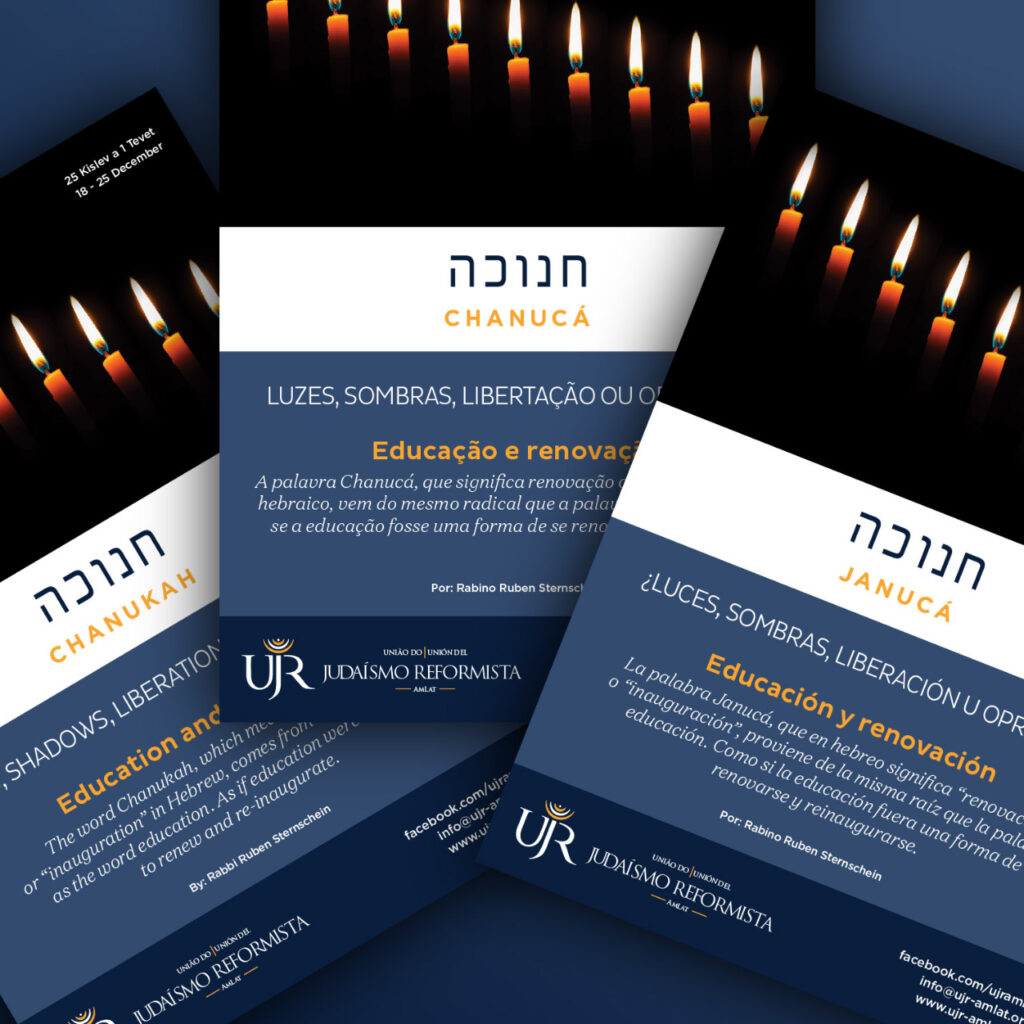Chanukah: Lights, Shadows, Liberation or Oppression?
Rav Ruben Sternschein
Chanukah 5783/2022
Education and renewal
The word Chanukah, which means “renewal” or “inauguration” in Hebrew, comes from the same root as the word education. As if education were a way to renew and re-inaugurate. In this sense, studying, either to revisit what is known or to learn what is known by others or even to research and discover the totally unknown, would be a form of rejuvenation. At least, mental, spiritual and who knows also physical insofar as everything is interrelated in a person.
The true core story
Although Chanukah has been publicized in recent centuries as the festival of lights, centralizing the ritual of lighting candles, this practice, in addition to being much later, is based on a marginal detail and not proven in historical sources.
The true documented history tells of the revolt of the Hasmoneans against the Hellenistic Seleucid invasion and the reconquest of Jewish autonomy represented in the rededication of the Temple of Jerusalem.
The Seleucid empire had changed its invasive policy by imposing restrictions on Jewish life in the land of Israel. Those Jews who had hitherto accepted subtle assimilative processes identified with the more radical ones and joined the Hasmonean family revolt in which all but one of the sons died in combat. Still, Jewish freedom was regained.
The origin of olive oil detail
More than four centuries later, in a rabbinic discussion about Shabbat, the Talmud tells us the legend according to which, being in the Temple, the fighters found only one day’s worth of oil and despite knowing that it would take eight days to produce more kosher oil, they decided to light what they had and it lasted all eight days.
Small Windows vs Giant Chanukiot
Based on this narrative, the practice of celebrating the festival for eight days was prescribed, lighting eight candles. Once lit, it is customary to place the chanukiah in the window or door to publicize the miracle, according to tradition. The lighting time criteria also consider the possibility of accessing more people. It is preferable to light it before the appearance of three stars so that more people will see the flame than at midnight, for example. Thus, in some sectors, especially Orthodoxy, the search for more ostensive lighting has developed: in large urban centers, shopping malls, at city entrances, in very high places and building giant chanukiot.
Arrangements with city halls and firefighters form part of these practices. Although a lot of light is distributed physically this way, and some people see this form of practice as a demonstration of external pride in being Jewish along with the possibility of telling the story – of olive oil? Rebellion for self-determination? – for most people, I believe something is lost in the subtle beauty of the metaphor proposed by the original window practice.
Lighting a small Chanukiah at home and placing it in the window can be interpreted as saying: everyone has their own light, their own ability and way of lighting and accessing it. Unique, and irreplaceable. I light mine in my own way and share it with openness and generosity, but also with humility and care, not to invade or overshadow. Anyone who wants to illuminate themselves with my light can only do so by their own decision. If you are also inspired to turn on your own light in your own way in your home, all the better. And if you still decide to put your chanukiah on your window too, then even better! I will also count on his light.
An immense chanukiah could suggest that it alone has the power to enlighten.
Reflections and Ironies
Educating and renewing are two verbs that include and act mutually and constantly in a virtuous circle when they are true.
The Hasmoneans wanted freedom from Greek impositions to practice Judaism and apparently ended up forcing several of the participants to join their revolt. On the other hand, their descendants ended up adopting Greek names and other practices.
The Hasmoneans were also called “Maccabees”’ and the Maccabiahs are Greek Olympic games between Jews who adopted part of Greek sports practices.
In the centuries of exile, the narrative of olive oil prevailed over the history of the struggle and reconquest of self-determination by the Jewish people, resumed mainly after the independence of the modern State of Israel, whose Zionist ethos always prioritized the value of making history and “in” history. instead of preaching miracles and expecting them to happen.
The Chanukah light is turned on inside and taken outside. At this moment, it is faced with others, receiving a light from outside and bringing it inside. A light that renews (chanukah) another light, from the inside out and from the outside in. Just how education does with the educator, with the student and with the content.
An oversized chanukiah can paradoxically dazzle and blind while pretending to be the only light.





